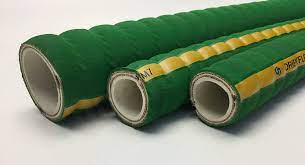CHEMICAL HOSE

Rubber chemical hoses are used in a wide range of industries, including chemical manufacturing, petrochemical, pharmaceuticals, and other processes where the safe transfer of aggressive chemicals is essential.
Dawn Ruuber Store provides Rubber chemical hoses that are designed for the transfer of various chemicals, acids, and aggressive substances in industrial applications. These hoses are constructed with materials that provide resistance to the specific chemicals they will come into contact with, ensuring safe and reliable transport.
Here are some key features and considerations for rubber chemical hoses provided by Dawn Rubber Store i.e.
Materials:
Inner Tube: The inner tube of chemical hoses is typically made from a rubber compound that is resistant to the specific chemicals being transferred. Common materials include EPDM (ethylene propylene diene monomer), UHMWPE (ultra-high-molecular-weight polyethylene), PTFE and HDPE.
Reinforcement Layer: Similar to hydraulic hoses, chemical hoses may have reinforcement layers, often made of high-strength synthetic fibers or metal braids, to provide strength and flexibility.
Cover: The outer cover is designed to protect the hose from external factors such as abrasion, chemicals, and environmental conditions. The cover material is chosen based on its resistance to chemical exposure.
Chemical Compatibility:
- When selecting a rubber chemical hose, it's crucial to consider the compatibility of the hose material with the specific chemicals it will come into contact with. Different chemicals may require hoses with different inner tube materials to ensure resistance and prevent chemical reactions. With years of experience Dawn Rubber Store experts quite easily guide customers about the right type of chemical hose as per their requirements.
Temperature Resistance:
- Chemical hoses must be able to withstand a range of temperatures, depending on the application. Some chemicals are transferred at elevated temperatures, and the hose should be able to handle these conditions without compromising its integrity. Again DRS experts guide their customers as per their requirements.
Pressure Rating:
- It is very crucial to consider the pressure requirements of the application and select a hose with an appropriate pressure rating. Chemical hoses come in various pressure classes to suit different industrial processes.
Flexibility:
- Chemical hoses need to be flexible for ease of handling and installation. The flexibility ensures that the hose can be routed and connected in various configurations within the industrial setting.
- Chemical hoses need to be flexible for ease of handling and installation. The flexibility ensures that the hose can be routed and connected in various configurations within the industrial setting.


